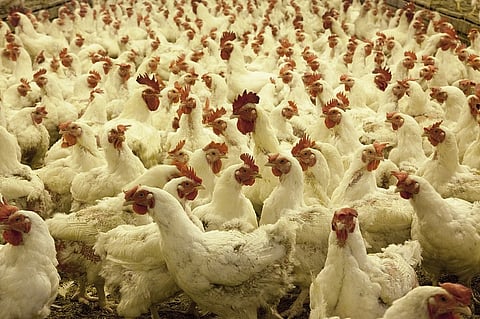

While working on an industrial IoT product for the manufacturing segment, founder of IoT-based startup MLIT -- Srinivas Chindam -- met the owner of a hatchery, who felt that there was a need for digitisation in the poultry industry.
Srinivas realised that the poultry business in India is rapidly growing, and was estimated to generate over Rs 26,000 crore revenue annually. India is the third-largest egg producer and fifth-largest chicken producer in the world, but the market is still very scattered in India, as most of the processes are manual.
They decided to take on the challenge. In 2017, MLIT decided to work on an IoT-based solution that would help monitor and improve the efficiency of a poultry farm.
The problem
A typical poultry farm has hatcheries, where the eggs are stored until they hatch. A hatchery has about 40 incubators, where the eggs are kept and monitored for 21 days before they hatch. During this time, the temperature and humidity of the incubator needs to be maintained at a certain level to ensure high-quality chickens.
Currently, most of the machinery is manual, and so are the operations. This makes it difficult to control and maintain the required levels of temperature, often causing damage to the output. With manual monitoring and extremely high levels of hygiene, the maximum production is 75% of the total eggs incubated.
Once the eggs hatch, the chicks are transferred to a farm, where they then need to be kept under favourable conditions and fed properly as per a certain weight requirement, which also needs to be monitored regularly.
“In terms of criticality, livestock is very sensitive. If there is a temperature or humidity change in the hatchery, the egg, chicken quality, efficiency and production goes down,” Archana, co-founder of MLIT says.
The hurdle is that there is no visibility in the incubation process and there is very little control in terms of managing the hatchery and its ensuring efficiency.
And that’s what MLIT wants to change.
What does it do?
“We are trying to solve the production inefficiencies in the poultry market, which are very dependent on labour. They still use operational manual data and manual machinery. We are trying to automate the industry and digitize it,” she adds.
MLIT has come up ‘PoultryMon’, a patented device it installs on incubators at the hatchery and at the farm which allows MLIT to remotely monitors and manage them. The sensor gives them real-time data on the temperature, humidity and other required parameters at the poultry.
A typical hatchery has 40 incubators and through PoultryMon, MLIT connects all the incubators and collects data at the hatchery-level and farm-level.
PoultryMon provides real-time data and insights to the owner, who can see what is happening at various locations. It also provides data and insights to the manager at the hatchery and farm-level. At the operator level, it gives them everyday data about what is happening inside the machinery.
“We provide alerts and notifications for any anomaly detection in real time. We give them reports on the efficiency of each cycle and each hatch. We help them understand what the difference between last cycle and this cycle was, what the anomalies were and what inefficiencies caused a difference between different cycles,” Archana says.
She adds that their insights help poultry farms increase their efficiency by a minimum of 3-5%.
MLIT generates revenue by selling the product and hardware's installation. Post this, MLIT charges based on an Annual Maintenance Contract for the reports given after each cycle.
MLIT, which is based out of Hyderabad’s T-Hub, currently has eight clients based out of Andhra Pradesh and Telangana.
The next step in the business for MLIT is to go one step ahead and control the hatcheries rather than just monitoring them. It wants to put control devices in place and replace all manual controlling equipment currently being used in poultry farms. This will enable poultry farms to manage and control their equipment through just a mobile app.
Archana says that MLIT’s technology is first-of-its-kind in terms of the cost and efficiency.
“Similar technology is available in markets such as the Netherlands and Europe, but their machinery is extremely expensive at about Rs 40 lakh per incubator, compared to which ours has all the features and is much cheaper and smaller in size,” she adds.
Given that the market is largely still unexposed in India, she believes that there is a huge opportunity for MLIT to scale operations.
MLIT plans to expand its operations to Kolkata in the next six months, and post this, it also sees potential in foreign markets such as the UAE.
Eventually, MLIT wants to be associated with every poultry player in India and digitise the entire market.